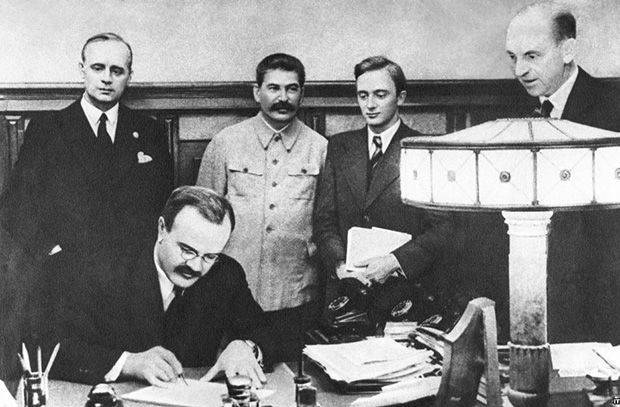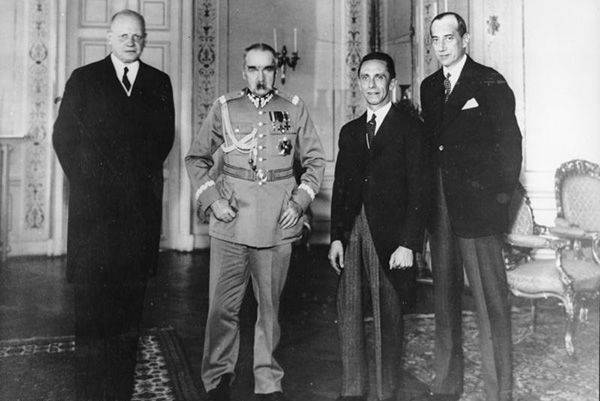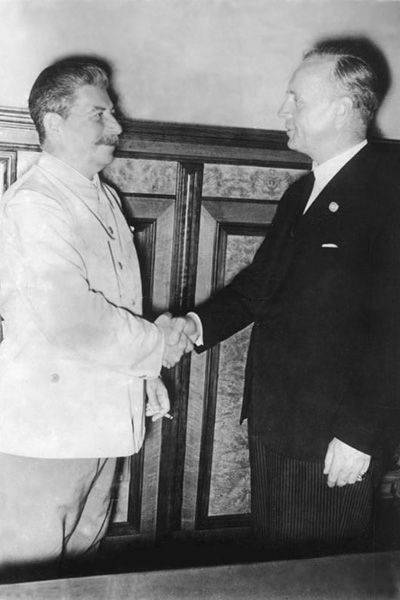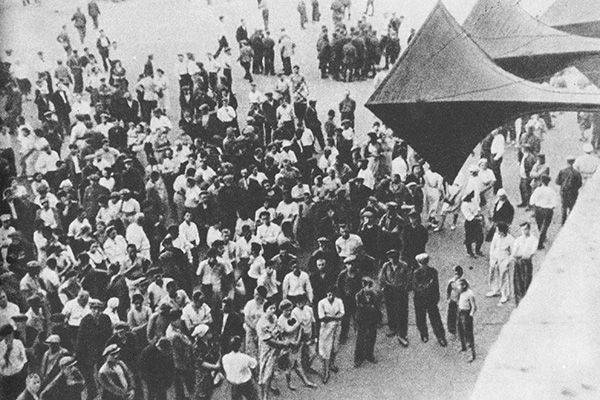The Soviet-German non-aggression pact: a story with a continuation

As the last prisoner in a row of people like him, the Molotov-Ribbentrop Pact was turned into a contrived symbol of the treachery of the USSR and Germany
At the end of last summer, without much ado, historians, primarily military, celebrated the 76 anniversary of the signing of the document, which largely determined not only the configuration of the political map of Europe on the eve of World War II, but also many of the problems of the post-war world. This is the so-called Molotov-Ribbentrop Pact, the official name of which is the Non-Aggression Pact between Germany and the Soviet Union.
Few which historical documents have such a significant impact not only on contemporary events, but also on international relations over the next three quarters of a century. Molotov Pact - Ribbentrop provides. Including because none of the participants in its preparation and signing was left alive, and the very assessment of this agreement has long turned from a historical issue into a political one. Agree, an amazing fact: the pact concluded more than 75 years ago seriously affects modern politics! And all, by and large, only because the notorious pact, like the events of recent years, determined primarily the right of Russia to act in international politics, proceeding primarily from its own interests. And just as the “allies” of the USSR did not like that at that time, the current “partners” of Russia also do not like this.
Five years of negotiations
To understand the meaning of the signing of the Non-Aggression Pact between Germany and the Soviet Union on 23 in August 1939 of the year, it is necessary to go a little further into the past - until about the 1934. It was then that the Nazi leadership of Germany, led by Adolf Hitler, made it clear enough to the whole of Europe that it did not intend to put up with the humiliating conditions of the Versailles Peace Treaty of 1918, which put an end to the First World War. The Franco-Soviet initiative to formulate and sign the “Eastern Pact” - a collective agreement on security and cooperation in Europe - was torpedoed by Germany. But not alone: along with Berlin, the idea of such a treaty buried Warsaw. In principle, this was nothing unexpected for Moscow: it was not by chance that until the middle of the 1930-s, Poland was viewed as the main enemy of the USSR in the West with its extremely aggressive foreign policy and large-scale support from Great Britain and France.
Moreover, as soon as the idea of the “Eastern Pact” was rejected, Germany managed to conclude a bilateral non-aggression pact with Poland. It was the first such document in a long series of similar pacts, the last of which was precisely the Soviet-German one. Note: the last! From which it clearly follows that until the very end of August 1939, it was the Soviet Union that was in the most uncertain state and had every right to expect any, even the most aggressive actions, from its closest neighbors, with which there were immediate borders.

But back to the general situation in Europe. According to Rolf Aman, a major West German researcher on the history of the pre-war system of European non-aggression pacts, “non-aggression pacts did not solve in the past and do not currently solve the problem of peace. Historical analysis shows that most non-aggression pacts were violated almost exclusively by the countries on whose initiative they were concluded. Such pacts led only to "moral disarmament", created the conditions for waging war on a limited scale and the implementation of indirect aggression. " And, alas, this is completely true with respect to the Molotov-Ribbentrop Pact. You just need to remember who and for what reason forced the signing of this document. And, contrary to the common version, it was not the Soviet Union at all.
What could be the Polish front
Indeed, the Soviet leadership was interested in concluding a similar pact with Germany. By the beginning of 1939, the European collective security system had practically ceased to exist. The Spanish Civil War, the Anschluss of Austria, the occupation of the Sudetenland of Czechoslovakia — all these events clearly indicated that the leading European powers, England and France, are ready to forgive Germany for any actions if they do not directly affect their interests. And the fact that Berlin took the most aggressive steps in the east only confirmed the fears that existed in Moscow that London and Paris were interested in the development of German expansion in this very direction.
It is also noteworthy that in the German-Polish non-aggression agreement concluded in 1934, there was no later binding point on respecting neutrality in conflicts of one of the parties with third countries. In other words, if Poland decided to attack the Soviet Union, Germany could very well provide her with military assistance. And in Moscow this possibility was considered seriously. To this, the Soviet party and military leadership was pushing overtly anti-Soviet rhetoric of the Polish side. This is, in particular, indicated by Russian President Vladimir Putin in May 2015 of the year at a joint press conference with German Chancellor Angela Merkel, referring to the circumstances of the conclusion of the Molotov-Ribbentrop Pact. But, like 76 years ago, the West did not hear these words, but managed to make out only a hint at Moscow’s desire to reconsider the negative assessment of the pact as such, “approved” by Western democracies.
But even in Western European historiography, it is not customary to conceal the fact that in the second half of the 1930-s in Warsaw they were seriously talking about the idea of creating a “third Europe” - the Baltic Union, a confederation of neutral countries from the Baltic to the Black Sea, in which the main role would play Poland. According to its design, this coalition was supposed to become a counterweight to the Anglo-French influence, and to the increasing pressure of the Axis countries - first of all Germany and Italy. At the same time, in Warsaw, they voiced aloud the idea of establishing a common Polish-Hungarian border and creating a Polish-Romanian union. And the implementation of these plans prevented only the existing territorial conflicts in Poland with Lithuania and the Czech Republic.
Their decision was made possible after Germany annexed Austria and invaded Czechoslovakia. It was at that moment that Poland sent its troops into the Cieszyn region, which it claimed to be from 1920, and demanded that Lithuania exclude from the constitution an item proclaiming Vilnius as the capital of the republic. The failure to comply with the latter requirement in Warsaw was connected with the possibility of achieving their own military force, and only direct political intervention by the USSR stopped the Polish forces concentrated on the Lithuanian border.
Get more - take less
Let us imagine that a neighbor lives on our staircase, which at each meeting requires us and other neighbors to share money, food, public services with it, and it does so in an extremely aggressive manner. Moreover, this aggressor neighbor managed to attract another neighbor to his side - a retired Special Forces soldier, whose family once occupied three rooms in a communal apartment, but after dismissal huddled in one. And although the special forces retiree is also not too shy in actions and expressions, he still gives the impression of a person who has influence on the neighbor-aggressor and with whom it is possible to agree. Will we give up even if this is not a very frank ally, in order to protect ourselves from foreign aggression? The answer, I think, is obvious.
Similarly, the meaning of the conclusion of a non-aggression pact with Germany was obvious to the leadership of the USSR. If Moscow manages to agree on joint security with Berlin, and all this against the background of interrupted talks on joint security with London and Paris over and over again, the Soviet Union will get the time it needs to strengthen its army - after all, the air no longer just smells of war, and frankly stinks of burning. In addition, it is possible to protect themselves from unpredictable actions on the part of the participants of the failed Baltic Union, primarily Poland.
Germany, on the other hand, was interested in a non-aggression treaty with the USSR almost more than the Soviet Union itself. In Berlin, it was well understood that only a concluded alliance with England and France and their satellites could force Moscow to oppose him. And as soon as there was a deadlock in the Anglo-Soviet negotiations, the German side sharply intensified its efforts to draw up and sign a non-aggression pact. If the USSR gave this document a guarantee of security, then the Nazi Reich was able to act in the West without fear of a threat from the East. What, in fact, proved the World War II that began soon.

Under these conditions, the Molotov-Ribbentrop Pact was signed. Much later, when it became known about the existence of a secret protocol to this pact, it was he who caused a colossal scandal. The agreement between the USSR and Germany on the division of spheres of influence in pre-war Europe was called Stalin-Hitler collusion and bloody sharing, or even worse, and nobody was alarmed by the fact that after six years, in January 1945, the very similar document was signed Stalin and Roosevelt and Churchill. But did the protesters of the Soviet-German pact object, you can compare the cannibal treaty of 1939 of the year to the weighted points of the Yalta accords, which were also signed by the victorious powers!
But then, in the 1939 year, the Soviet Union, concerned about its security, received much more on paper than it did in reality. The secret protocol stipulated that the border of the spheres of interests of Germany and the USSR in the Baltic States was the northern border of Lithuania, which at the same time received Vilnius, which at the time remained Polish. Through the territory of Poland, the division of interests took place along the rivers Narevu, Vistula and Sana, and the issue of Poland’s independence, as stated in the document, could “be finally clarified” later, by agreement of the parties. In addition, the protocol recorded the interest of the USSR in Bessarabia, for which Germany refused.
In fact, after 1 September 1939, when the German aggression against Poland began and the country soon abandoned to the mercy of fate by its government surrendered to a much stronger and organized enemy, the Soviet Union occupied a much smaller area than the secret protocol provided. The lands of Western Belorussia and Western Ukraine, up to the Bug, which were part of Russia before the 1920 of the year — that is, before they were occupied by Poland — became Soviet. Bessarabia became Soviet too, which was also a Russian territory before the 1920s. That is, in fact, Moscow only regained the lands it lost in the chaos of the Civil War and intervention.
From the point of view of the actual Soviet-German relations, the pact changed very little and fully fit into the tradition of other similar pacts. He stipulated that the parties to the agreement refrain from attacking each other and observe neutrality if one of them becomes the object of military actions of a third party, refuse to participate in the grouping of powers “directly or indirectly directed against the other side”, and organize mutual exchange information on matters affecting the parties.
Allies who have forgotten about the union
What else is worth remembering, raising the question of why the Soviet Union signed the non-aggression pact with Germany on 23 August 1939 of August? The fact that such covenants, significantly complicating the position of the USSR in the European foreign policy arena, with other countries, one way or another connected with the confrontation of Moscow, Berlin signed earlier. The non-aggression pact with Lithuania concluded 22 March 1939 of the year (it also attached an agreement on the transfer of Germany to the Memel region - lands around modern Klaipeda), with Denmark - 31 May 1939 of the year, with Latvia and Estonia - 7 June 1939 of the year. Thus, the Soviet Union, we emphasize this once again, was the last of Germany’s partners to conclude a similar agreement with it. And this agreement played its undoubtedly positive role in the pre-war Soviet history. The remaining one and a half years before 22 June was enough to lay the foundation for the rearmament of the Red Army, which, albeit belatedly, at the cost of huge losses in the initial period of the Great Patriotic War still led our country to Victory.

And one more thing to remember is always when it comes to political agreements. Cynical Western politicians have long ago formulated the principle that there are no allies in political games, but only temporary partners. But, as always, Western democracies only allow themselves and their satellites to use this approach. When someone else, no less strong, but less unprincipled, takes up the handle of the same weaponsscreaming about secret conspiracies, violating human rights and bloodthirsty ambitions. Even if a country that was forced to conclude a not very clean foreign policy agreement, you have to pay a tremendous price for the treachery of its partner to this partner - tens of millions of lives of its citizens. To pay in order to save an entire civilization from her opponent who deceived her. The one that later her and accused of deceit.
However, then, in August 1939 of the year, even in the Soviet leadership no one could have thought of what a long echo the treaty would have so much needed by the USSR at that moment. Moscow sought to gain time in order to become stronger and stronger, and got it. And the Great Patriotic War, which took place in less than two years, only confirmed the validity of the fears of the Soviet government. Post-war events have proved how fair the principle "in political games there are no allies." As soon as the victorious country, like the USSR, was shaken and collapsed into the abyss of internal political disasters, exactly how 23 of August 1939 in Europe was called the day of memory of victims of Nazism and Stalinism. The fact that the Molotov-Ribbentrop Pact was a forced measure and was the last in a row like it, the West prefers not to remember - we must think so as not to spoil our game.
Information